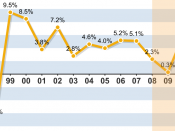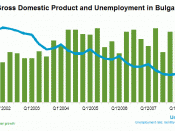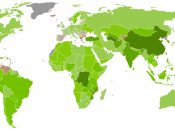Economic growth is a measure of an economy's annual rate of change in real gross domestic production (GDP). The most important factor affecting the rate of economic growth is aggregate demand which is the total expenditure of an economy. It consists of consumption; investment; government expenditure (fiscal policy); and the ratio of imports to exports.
The demand for labour is derived from the demand for goods and services. This is due to the fact that labour is required in the production of goods and services. If the level of aggregate demand for goods and services in the economy changes, this will be reflected in the demand for labour and thus the rate of unemployment.
Consumption will be influenced by the level of both interest rates and inflation rates. An increase in the general level of interest rates would have the effect of discouraging individuals from spending. Rather than spending, consumers will have a greater tendency to save, creating greater leakages and thus have the effect of reducing the level of consumption.
Similarly if interest rates are lowered, the rate of consumption will increase.
Expectations about inflation will also affect consumption. If it is thought that inflation will stay low consumers will tend to save, knowing the price will be the same later. If the rate of inflation is high, and prices are expected to rise however, consumption will increase as consumers believe the good will be more expensive later. A change in the level of consumption provokes a change in the level of economic activity and thus a change in the rate of economic growth.
Business expectations and interest rates will affect the level of investment contributing to the rate of economic growth. A fall in interest rates would make it cheaper for firms to borrow funds to invest in...


